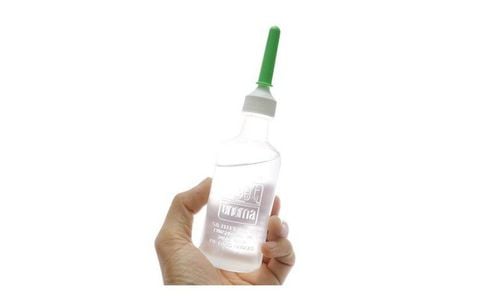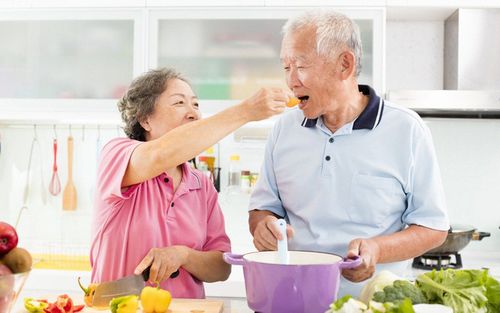This is an automatically translated article.
The article is expertly advised by Dr. Doctor CCII Phan Thi Minh Huong - Department of Medical Examination & Internal Medicine - Vinmec Danang International General HospitalThere are many causes of constipation in the elderly. If the disease is not treated in time, it can lead to a number of dangerous complications.
1. Why do elderly people often suffer from constipation?
Food after entering the stomach will be crushed by the contractions of the stomach and secretions from the stomach. The food is then passed down to the small intestine. Here the nutrients will be absorbed, and the waste will be taken to the large intestine.
Constipation occurs when for some reason the stool moves too slowly in the large intestine, causing the stool to absorb more water than usual and become hard when it reaches the anus.
There are many causes of constipation such as: Due to medication, habits, diet, systemic disease or physical damage to the digestive tract. However, constipation in the elderly is common in some of the following causes:
1.1 Impaired physical activity
Most elderly people are aware that movement makes every organ of the body work regularly, but there are some cases where for some reason sedentary activity must be limited such as: Chronic knee pain Calculation, back pain, weak legs, difficult to walk, it is easy to get constipated in the elderly.1.2 Due to drinking less water
This phenomenon is common in most elderly people, especially those with pathologies in the urinary system or the elderly with prostate cancer, so they do not want to drink water. Drinking less water is also one of the factors that lead to constipation.
Một trong những nguyên nhân gây táo bón ở người già là uống ít nước hoặc không đủ nước
1.3 Due to improper nutrition
Especially a diet low in green vegetables and fresh fruits, some are required in the treatment of a certain disease, but the patient is excessively abstinent; Eat less or do not want to eat, so there is little residue, small stools do not create a contraction reflex of the colon. Other elderly people eat foods that are high in fat, such as butter, milk, refined sugar, and low-fiber, spicy, and hot foods.1.4 Due to side effects of drugs
The use of drugs with tannins, antidepressants, drugs that coat the stomach lining containing aluminum, abuse of some drugs with laxative effects, due to excessive use, do not have the desired laxative effect. This makes it difficult for the elderly to have a bowel movement.1.5 Hemorrhoids
When suffering from hemorrhoids, patients often tend to refrain from defecation for fear of pain and bleeding. When holding a bowel movement for a long time and many times, it will cause a decrease in defecation reflex, leading to the accumulation of stool, so it will be constipated. The more constipated, the more painful the bowel movements and the easier it is to bleed. As a result, the more patients hold back from defecation, the more constipation progresses into a vicious cycle.
In addition, there is another reason to pay attention when the elderly have constipation that is the physical damage to the digestive tract or nearby organs, especially colorectal cancer or some other lesions. Other injuries constrict the lumen of the colon.
2. Complications of constipation in the elderly
Constipation in the elderly, if not treated promptly, can lead to some dangerous complications such as:
Tightening of stool in the colon due to constipation, then the elderly have to push a lot leading to the heart palpitations, fatigue, or even unconsciousness or sudden death from a heart attack. The elderly are weak and weak, when the elderly have difficulty in defecation, they must exert a lot of effort, so it may rupture the alveoli. When the elderly are constipated, they can't defecate, so the stool can press on the bladder causing urinary retention leading to kidney retention and long-term complications of kidney failure. Repeated straining can lead to rectal prolapse, the risk of internal and external hemorrhoids (each time passing fresh blood during or after a bowel movement), chronic constipation can be a risk factor for colon cancer and rectal. Constipation in the elderly can also be a risk factor in people with hypertension, atherosclerosis, arrhythmia...

Táo bón có những biến chứng nguy hiểm có thể gây loạn nhịp tim ở người già
3. Treatment and prevention of constipation in the elderly
Must find out the cause of constipation to treat and prevent constipation in the elderly. In addition to treating the root cause, if constipation is caused by other causes, it can be treated and prevented by:
If it is due to a side effect of the drug, you can ask the doctor to stop the drug or change another suitable drug . Eat foods high in fiber and drink enough water: Fiber is found in vegetables, fruits, tubers and whole grains. Fiber not only forms waste but also eliminates toxic substances from the body, attracts water to increase stool volume, stimulates the activity of mucus cells and increases intestinal motility. Vegetables and whole grains not only provide a lot of fiber, but also protect the heart, prevent cancer and improve the immune system. Do gentle exercises to strengthen the abdominal circulation, the ability to work the pelvic floor muscles, and make defecation easier. To defecate at a certain time and sit on the toilet in the right position: To treat and prevent constipation in the elderly, it is advisable to practice the habit of defecating at a certain time, preferably in the morning. If sitting on the toilet, the most correct defecation position is to use a small stool under the feet so that the abdomen and thighs form a 45-degree angle. Keep mentally comfortable: In health care, psychological factors always play an extremely important role in maintaining and repelling diseases. So keep an optimistic mind, avoid anxiety, depression, anger, insomnia. Use of laxatives: Constipation in the elderly can be used with laxatives to soften stools, to support when unable to have bowel movements for many days. However, this method should not be abused because it can cause reverse constipation.
Please dial HOTLINE for more information or register for an appointment HERE. Download MyVinmec app to make appointments faster and to manage your bookings easily.













